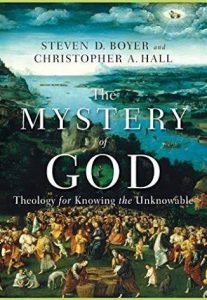 Takeaway: The Mystery of God is a real part of historical Christian Theology. But it is not useful as a way to explain away all the difficult parts of the bible or theology.
Takeaway: The Mystery of God is a real part of historical Christian Theology. But it is not useful as a way to explain away all the difficult parts of the bible or theology.
As I have been reading about the Trinity over the past year or so, I have run across the idea of the mystery of God as an explanation of difficult parts of theology. It often feels more like, “I don’t want to fully deal with this, so I will call it a mystery of God.” At the same time I have been reading introductions to Catholic theology and a few books on the importance of beauty; in both areas there is a full embracing of the need for mystery, not just to explain difficult areas of theology, but to allow for the bigness, uniqueness and unpredictable ways of God.
So I accepted a review copy of the Mystery of God hoping it would touch on more of the later and less of the former.
Boyer and Hall exceeded my expectations. The first part of the book is historical theology. Hall and Boyer walk the reader through a variety of Christian theologians, Aquinas, Augustine, Calvin, Luther and others to illustrate that throughout Christian history the concept of God as unknowable has always been present.
This first section is a bit on the dense side, and I would like to read it again in the not too distant future. But the overall message was clear. When we speak of God, the words that we use are necessarily limited. This is well illustrated by this passage,
“Even in what seem the simplest statements, such as “God is here with us,” we find that every word is affected by the fact that the sentence is about the mysterious Creator. For God is not “here” that is, “spatially present” in any way that we clearly understand; and he is not “with” us in the way that creatures are “with” each other. In fact, it is not even true that God “is” in the same way that a creature “is”: as we saw a moment ago with respect to simplicity, God’s “is-ness,” God’s being or existence, is not like that of creatures.”
At the same time historical Christianity has affirmed that God has revealed himself both through Christ as a specific human person that lived about 2000 years ago and through scripture and through general revelation and through the particular revelations of the Holy Spirit. So God can be knowable, but only partially knowable.
Boyer and Hall then use several specific doctrines to illustrate how this works in out concretely. Chapters on the Trinity (some of the best I have read about the trinity), Christ’s incarnation, Salvation and Election, Prayer and our relationship to other religious traditions all show that we need both mystery and clarity in our Christian life. These are not the easy parts of theology, but the very areas that we need to point to mystery and at the same time we cannot abandon our search to understand the doctrines theologically.
One of things I most appreciate about this book is that the authors ground it in historical theology and devotional practice. “To know the God who surpasses knowledge requires not just having the right sources of information. It requires being the right kind of knower.”
The second part of the book is less dense and more ‘practical’ in focus, but you have to at least skim the first part to understand what the authors means when looking at the second part. An ongoing illustration about the difficulty of explaining a three dimensional object to a two dimensional person is used throughout the book. This is not a perfect illustration, but it gets the point across. A two dimensional person can theoretically understand that a ball is like a circle but different or that a cylinder is both like a circle and a rectangle depending on which direction you look at it, but a cylinder is not actually either a circle or a rectangle.
Hall and Boyer are clear that the mystery of God is not that God is unreasonable but that God is beyond our capacity for reason. “Yet, as we noted in chapter 1, it would be foolish for us to stop demanding answers every time anybody cried, “Mystery!” Mystery is not a get-out-of-jail-free card that can be played any time a theologian is in a logical jam.” So the authors attempt to give a roadmap for how to use mystery appropriately. Their solutions interact with some post-modern theories of truth but in a way that I think most evangelicals will accept and agree with.
This is a very helpful book to look at the limitations of our knowledge as Christians and what it is that we can expect to know (and be able to share with others) about God. There are some fairly dense parts to the book but it is well worth struggling through them to get to the second part of the book and look at the more practical theological applications for how we understand mystery as Christians.
The Mystery of God Purchase Links: Paperback, Kindle Edition (I purchased the Kindle edition to read again later this year. It is lendable on kindle. If you want to borrow it leave a comment below)
__________
A digital copy of this book was provided by the publisher for purposes of review through Netgalley.
Thanks for your comments here. I wholeheartedly endorse this book as it has very significant contributions and clarity to the “dribble” around mystery. See my series of posts here.